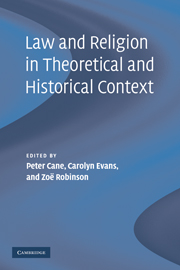Book contents
- Frontmatter
- Contents
- List of Contributors
- 1 Introduction
- 2 The moral economy of religious freedom
- 3 Understanding the religion in freedom of religion
- 4 Why religion belongs in the private sphere, not the public square
- 5 Pluralism in law and religion
- 6 The influence of cultural conflict on the jurisprudence of the religion clauses of the First Amendment
- 7 From Dayton to Dover: the legacy of the Scopes Trial
- 8 A very English affair: establishment and human rights in an organic constitution
- 9 Days of rest in multicultural societies: private, public, separate?
- 10 Australian legal procedures and the protection of secret Aboriginal spiritual beliefs: a fundamental conflict
- 11 Secular and religious conscientious exemptions: between tolerance and equality
- 12 Law's sacred and secular subjects
- 13 Freedom of religion and the European Convention on Human Rights: approaches, trends and tensions
- Index
- References
1 - Introduction
Published online by Cambridge University Press: 07 July 2009
- Frontmatter
- Contents
- List of Contributors
- 1 Introduction
- 2 The moral economy of religious freedom
- 3 Understanding the religion in freedom of religion
- 4 Why religion belongs in the private sphere, not the public square
- 5 Pluralism in law and religion
- 6 The influence of cultural conflict on the jurisprudence of the religion clauses of the First Amendment
- 7 From Dayton to Dover: the legacy of the Scopes Trial
- 8 A very English affair: establishment and human rights in an organic constitution
- 9 Days of rest in multicultural societies: private, public, separate?
- 10 Australian legal procedures and the protection of secret Aboriginal spiritual beliefs: a fundamental conflict
- 11 Secular and religious conscientious exemptions: between tolerance and equality
- 12 Law's sacred and secular subjects
- 13 Freedom of religion and the European Convention on Human Rights: approaches, trends and tensions
- Index
- References
Summary
It was not so long ago that confident predictions were being made about the eventual demise of religion. Religious people complained that liberal states had privatised religion; excluding it from the public square until such time as developments in science, education and philosophy rendered religion entirely obsolete. With the exception of the unusually religious United States, religion in the second half of the twentieth century played relatively little role in public domestic debates in Western societies and was rarely considered in international affairs. As former US Secretary of State Madeleine Albright put it, most Western political leaders in the 1990s thought that religious disputes ‘were the echoes of earlier, less enlightened times, not a sign of battles to come’.
Now, however, religion is back on the public agenda both domestically and internationally. Questions about the role of religion in public life are being prompted by a range of changes in many Western states. The power of 9/11 and terrorist attacks or threats of such attacks has been a powerful motivating factor in such reconsideration. In many ways this is unfortunate as it tends to skew the public discussion towards a debate over religion as a tool of terrorism or to a debate over Islam and the West.
Yet, long before the attacks on the World Trade Centre, there were complex and important questions being asked about the role of religion in society.
- Type
- Chapter
- Information
- Publisher: Cambridge University PressPrint publication year: 2008
References
- 2
- Cited by

